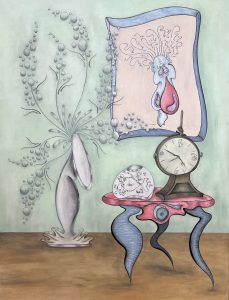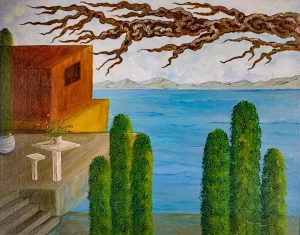You want to be a writer.
So… write.
Like me, I bet you hold a romanticized idea about what a professional writer is. Society has this vision that the only writers are New York Times best-seller personalities, like Neil Gaiman, Stephen King, or J. K. Rowling. But most writers (85%) are drafting copy for toothpaste ads, helping businesses with social media posts, drafting business materials or contracts, creating textbooks, working journalists, or crafting the words spoken by a talking head.
Like writing jokes for delivery by famous people like Bill Maher.
For this month’s Artist Spotlight, let me introduce you to my new hero, Tony DiGerolamo, “Tony D.”
Why my hero?
As a budding writer, I’m getting to know — really know — the industry. Those we know as “authors” are such a small percentage of the army of writers the world over. Consider Tony. You’ve probably not heard his name, but you know his work. This New Jersey screenwriter, novelist, comic book writer, game designer, and comedian is the genius behind familiar work like: The Simpsons, the Bart Simpson comic books, and Politically Incorrect with Bill Maher (joke writer). His writing career fills his Wikipedia and IMDb pages.
THE SHORT OF IT
Tony calls himself the weirdo who makes books and comics. His publishing company, South Jersey Rebellion Publications, is the home for his Jersey Devil Comics. He releases four videos each day on his social media channels. Two on YouTube; two others on either Odysee or Rumble.
He’s on book nine of his Piney’s series.
He dotes on his Bichon-Maltese, Joan of Arc, and he would love to be cancelled.
“Look at Dave Chappelle. I’d love to be cancelled. It would draw attention to my books.”
THE LONG OF IT
After earning a Communication degree (TV, Radio and Scriptwriting) from Ithaca College, Tony made his way to Hollywood where he wrote comedy and tried to sell his screen plays.
“I left after three months. LA is not the place to just show up and get anywhere. I knew I’d have to build a career and then return as the guy who does this.” He adds: “Those people in Hollywood are incredibly unhappy. The most miserable people on earth. Trying to cut deals with them — when they are so wrapped up in themselves. Dude, I thought, they’re living a lie.”
Back in Jersey, he launched his career. He did The Comic Book Show on cable and pushed to syndicate it. He managed a comic book store and had the writing gig for Bill Maher. He wrote screenplays. He wrote for The Simpsons. He wrote for The Simpsons comic site, Bongo, and did freelance for anyone who would pay.
His IMDb does not capture the sweat and effort he invested in his career.
PROMOTION
I asked how does he do it. It seems like a lot of work to me…
“I started on YouTube in 2008 and by 2014 was doing regular videos. Over the years, I’ve gotten better equipment. It’s easy now. I just talk off the top of my head — offering my opinion about a current topic. Nothing elaborate. You have to streamline your posts to what you can handle. But to get noticed and stay relevant, you need to post videos consistently — a video a day at least. The sweet spot seems to be 2 eleven-minute videos a day to master the algorithm. But you have to do it consistently. It takes at least a year to get those first 1000 subscribers. Then you get monetized.”
His Screenwriter’s Rant — where he reviews films and shows — has become a regular on my watch list. But I notice, he does post every day. I ask if that is his sole method of self promotion. I know I’m overwhelmed by the amount of social media I feel I need to generate.
“Local promotion — like through subscription television — is good. YouTube is better. Once you have 10,000 fans, 10% of those will be hardcore and will always buy your stuff. You just need to put out books consistently.”
We talk about how I think many writers don’t appreciate that level of commitment. Being a writer is not a one and done. In my last coaching workshop, the would-be writers had this idea that writing that one great novel was the goal. A writing career is not some magic formula. It’s hard work. It’s focus. It’s practicing. It’s self promotion. It’s identifying your niche and your brand. And, well, writing. Every day. All the time.
THE WRITER’S LIFE
“Time management is key. You have to be purposeful. You can’t just screw around. You gotta say, okay, I know what this takes because I do it on a regular basis. I know how long it takes to produce x. Then you have to stick with a schedule.”
Most budding authors spend time shopping for an agent. Wouldn’t attracting an agent be easier?
“I had an agent. He was a nice guy. He almost got me work. But that’s the confusion: An agent is not there to get you work. An agent is there to manage you because you have too much work to manage on your own. You need someone to review contracts and merchandising. You have to get big enough to need an agent. Hell, Bill Murray still doesn’t have an agent.”
Tony’s philosophy, which I have heard from several professional writers: Writers write. Even when you get that magic viral book or story, you still need to write.

THE PINEY’S
South Jersey residents, often called Pineys because we live in the middle of the pine forest that is this part of the state, are familiar with the Jersey Devil. I talk about the folklore in my post, New Jersey: A Vacation to Remember. Come to the Shore — See Demons!
I read Tony’s first book in the series, The Piney’s Book 1: My Cousin, the Piney,after speaking with Tony at an art fair. As a Jersey Girl familiar with the Jersey Devil mystique, I had to read that first book. And I’m hooked on the characters and the concept. The book was self-aware and laugh-out-loud funny, as the characters battle devils and destroy a boardwalk.
He said: “The Piney series is my main thing. I’d love a good television interview, but local reporters don’t do that kind of interest story anymore. That’s the reason I started my YouTube and social media channels. Television is irrelevant. You’ve got to get out there and reach people.”
He’s completed the tenth book and on his way to finishing the eleventh. The ninth, about witch hunters on the unnamed but obvious Rowan College campus, is published and ready for his fans to enjoy.
I have a lot of reading to catch up.

READERS: THE CUSTOMER
As I’ve been making money on contract gigs, Tony and I chat about his contract work. He’s working on a screen play now, noting it’s difficult to raise money to produce a film. The project he’s working on still needs more than 100 grand. Often, he is paid for his writing, cartoons, commercials, sitcoms, and the work is never produced.
“People in the corporate world think more words are better. That a simple and short response is weird. The boss asks what’s happening with project whatever. And it’s weird if we say we’re working on it. It has to be pages of reporting. Good writing is not wordy. It’s effective.”
We chat about corporate writing, with which I am painfully familiar. It’s true: Writing a business plan or an employment manual — even a technical instruction manual — is often far more complicated than necessary. Tony takes a direct approach with his clients:
“You hired me. I’m the expert. You guys are the business guys. I’m the creator.”
It’s a perspective not often expressed. As writers, we are the experts at writing. Most of the time. Tony reflects on the business of writing, noting how young writers are devoted to their ideas — even if those ideas fall flat.
“Remember, the audience is your customer. They want certain thigs and you have to give them that service. They can, at any time, say I don’t like this book. You have to create ideas — and let them go. Burn through them. There is some value in refining a piece, sure, but you can’t polish a turd. You have to strengthen your ability to walk away from what doesn’t work. Start by stepping away from a project for several months to get clarity.”
VALUABLE ADVICE
Tony talks about his comedy career: He’s performed in the Philly comedy scene for over ten years. He’s performed and directed several improv groups. And he can’t say enough about the benefit of creating on his feet. I come to appreciate that improv is a tool for learning to think outside the box — and be entertaining.
“New writers don’t understand the basics. You can’t break the mold if you don’t understand the basics. You have to do a lot of it (writing). You have to read a lot. You have to write stupid stories and make mistakes to learn to write better stories. Slow down. You have to offer a story.”
Tony lives off his writing. That’s a dream budding writers have as they squeeze writing time into evenings and weekends while working a full-time job. His formula is simple: Write for your reader. Write more. Tell people about it. Make money. Write more.
It’s an admirable career, a model to follow, and powerful lessons from the man who has been there, done that.



